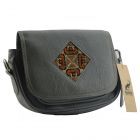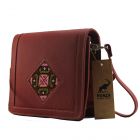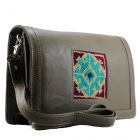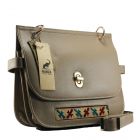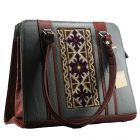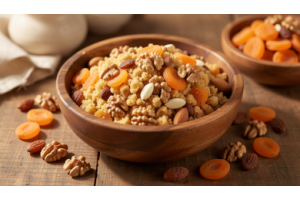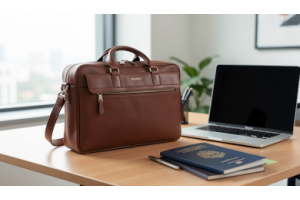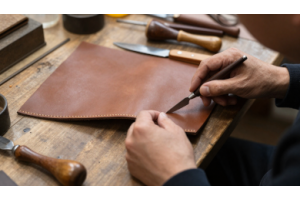Why Knowing Who Made Your Bag Matters: The Beauty of Hunza’s Ethical Craftsmanship
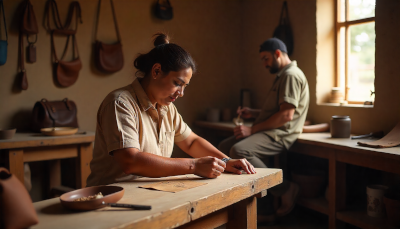
Why Knowing Who Made Your Bag Matters: The Beauty of Hunza’s Ethical Craftsmanship
Knowing who made your bag adds meaning beyond style. In Hunza, Gilgit-Baltistan, women artisans are the heartbeat of the region’s rich cultural heritage. They create exquisite handmade items such as wallets, bags, carpets, and embroidered accessories using yak leather and threads made from sheep and goat wool. Each piece reflects hours of careful work, traditional techniques, and sustainable choices. By choosing these ethically crafted bags, you’re not just buying fashion—you’re supporting fair wages, preserving centuries-old craftsmanship, and celebrating Hunza’s vibrant culture. It’s a way to carry pride, purpose, and a tangible connection to the region wherever you go.
Table Of Content
1. Authentic Connection
Authentic connection transforms a simple purchase into something deeply meaningful. When you buy a bag from Hunza, it’s more than an accessory—it carries the story of skilled women artisans who have inherited centuries-old traditions of embroidery, weaving, and leatherwork. Each stitch, pattern, and detail reflects cultural pride and painstaking craftsmanship, creating a unique bond between the maker and owner.
- Personal Meaning: Each handmade bag tells the story of its creator and Hunza’s rich craft traditions.
- Emotional Value: Knowing the artisan adds sentimental worth beyond material quality.
- Trust and Transparency: You understand where your bag came from and who made it.
- Artisan’s Passion: Every detail reflects skill, dedication, and cultural pride.
- Purposeful Fashion: Your purchase supports meaningful connections and celebrates Hunza craftsmanship.
Tip
Look for Hunza bags that showcase embroidery, yak leather, or wool threads made from sheep and goats. This ensures your purchase supports the women artisans and preserves local traditions.
2. Ethical Sourcing
Ethical sourcing in Hunza ensures that materials and labor are responsible and sustainable. Women artisans use locally sourced yak leather for durable bags and wallets, and threads from sheep and goat wool for embroidery. Supporting these artisans ensures fair wages, safe working conditions, and the preservation of traditional techniques. Your purchase helps reduce the environmental impact of mass production while investing in authentic, high-quality handmade products.
- Fair Wages: Women artisans are compensated fairly for their skill, time, and effort.
- Safe Working Conditions: Production respects artisan safety and well-being.
- Local Materials: Yak leather, sheep, and goat wool threads are responsibly sourced in Hunza.
- Reduced Mass Production Impact: Handmade items avoid exploitative industrial practices.
- Community Support: Purchases help sustain small artisan communities and cultural traditions.
3. Cultural Preservation
Hunza is rich in culture, tradition, and artistry. By choosing handmade products from the region, you help preserve embroidery, weaving, and leathercraft techniques that have been passed down for generations. Each bag, wallet, or carpet reflects the vibrant patterns, colors, and motifs unique to Hunza’s heritage. Supporting these crafts safeguards cultural identity while promoting sustainable and ethical fashion.
- Traditional Techniques: Artisans use embroidery, weaving, and yak leather crafting methods passed through generations.
- Heritage Protection: Handmade Hunza items preserve centuries-old cultural history.
- Support Artisan Communities: Your purchase sustains local families and small businesses.
- Unique Designs: Every piece carries distinctive patterns and textures of Hunza’s artistic legacy.
- Sustainable Fashion: Preserving traditional skills promotes mindful, ethical production.
4. Quality and Durability
Hunza artisans are known for their precision and meticulous craftsmanship. Handmade items from the region—crafted with yak leather and high-quality wool threads—are designed to last, combining strength and elegance. Investing in these durable items reduces waste, supports sustainable practices, and allows you to enjoy long-lasting, functional, and culturally rich products.
- Superior Materials: Yak leather and sheep/goat wool threads ensure high-quality, long-lasting performance.
- Attention to Detail: Every stitch, embroidery, and finish is carefully executed.
- Timeless Design: Handmade bags maintain both style and utility for years.
- Reduced Replacement: Durable craftsmanship reduces the need for frequent purchases.
- Reliable Functionality: Products are made to handle daily wear with precision and care.
5. Empowered Artisans
Women artisans in Hunza are empowered through their craft. Every purchase of a handmade bag, wallet, or carpet contributes directly to fair wages, independence, and opportunities to sustain their livelihoods. This empowerment allows them to preserve traditional skills like embroidery, weaving, and leatherwork, while promoting Hunza’s rich cultural heritage. Supporting these artisans strengthens the community and keeps centuries-old traditions alive.
- Fair Wages: Women artisans earn fair compensation for their expertise and effort.
- Community Support: Buying supports families and local communities in Hunza.
- Skill Preservation: Traditional embroidery, weaving, and yak leather techniques continue to thrive.
- Economic Growth: Handmade products contribute to Hunza’s local economy responsibly.
- Empowerment Through Work: Artisans gain independence, confidence, and opportunities to grow.
FAQs
1. Why is it important to know who made my bag?
Knowing who made your bag connects you to Hunza’s women artisans, ensures ethical sourcing, and supports traditional craftsmanship and cultural heritage.
2. How does ethical sourcing affect the quality of the bag?
Ethically sourced yak leather and sheep/goat wool threads produce durable, high-quality handmade products while supporting sustainable practices.
3. What does cultural preservation mean in Hunza handmade products?
Cultural preservation means maintaining embroidery, weaving, and leathercraft techniques passed down for generations, keeping Hunza’s traditions alive.
4. How do handmade bags empower artisans?
Every purchase provides fair wages and economic opportunities for women artisans in Hunza, allowing them to sustain their craft and preserve cultural heritage.
5. Are Hunza handmade bags more durable than mass-produced bags?
Yes. Crafted with yak leather and high-quality wool threads, Hunza bags are durable, long-lasting, and functional.
6. How can I verify if a bag is ethically made?
Look for brands that share the artisan’s story, highlight yak leather or wool threads, and showcase traditional Hunza embroidery and weaving techniques.

